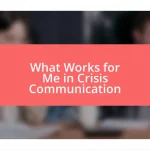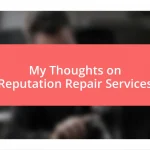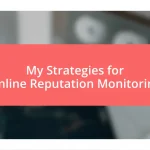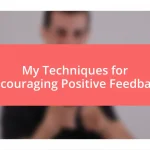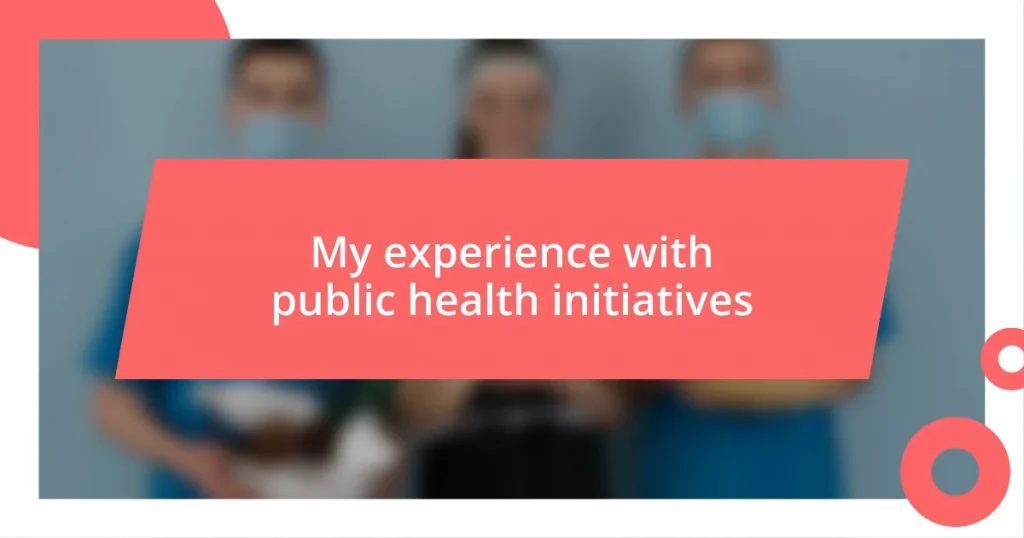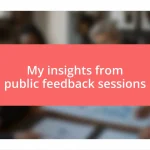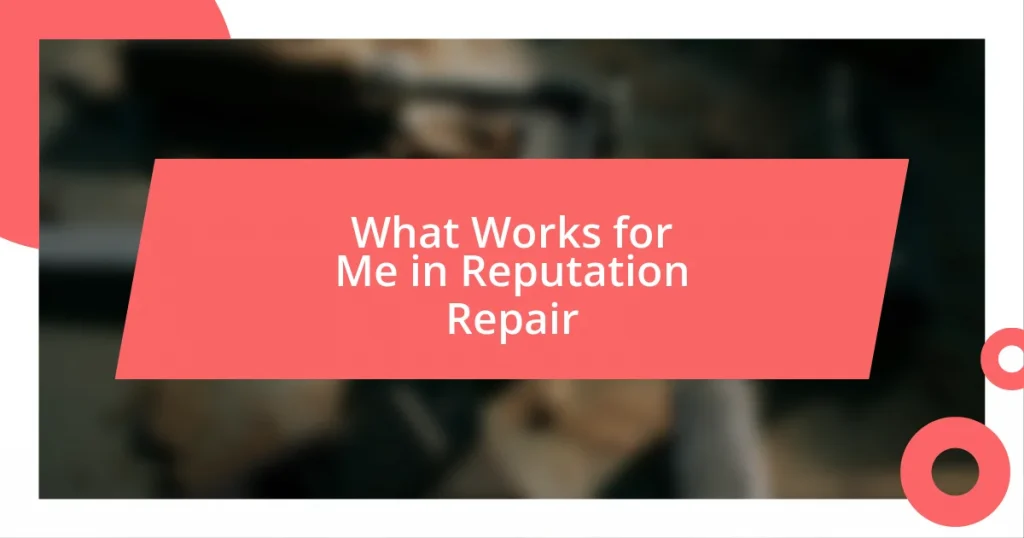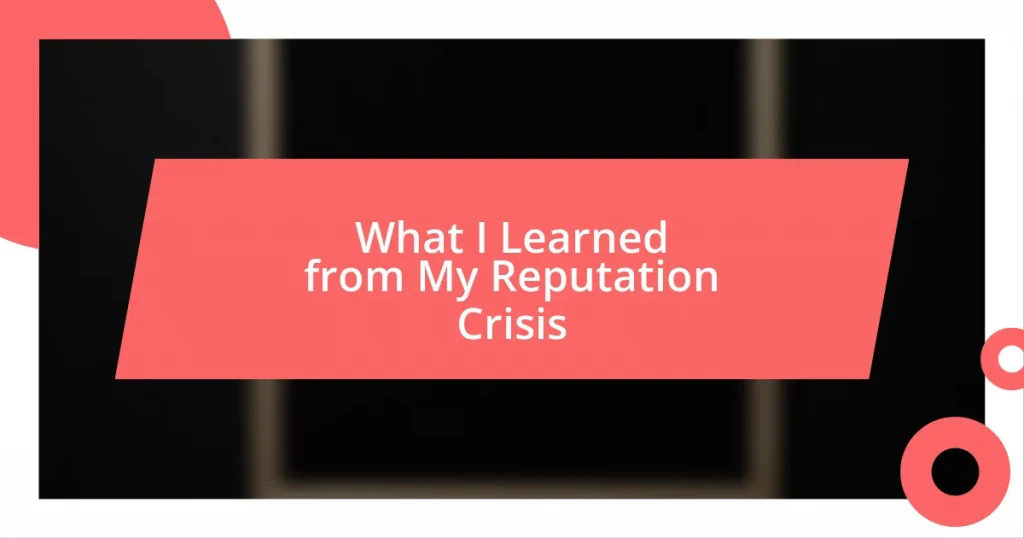Key takeaways:
- Public health initiatives can transform communities through effective communication, teamwork, and education, as seen in campaigns for vaccination, smoking cessation, and mental health awareness.
- Challenges such as misinformation, funding sustainability, and cultural competency highlight the importance of relationship-building and tailored messaging in public health efforts.
- Engaging community feedback, leveraging technology, and fostering collaborations are crucial strategies for enhancing the effectiveness and reach of public health initiatives in the future.
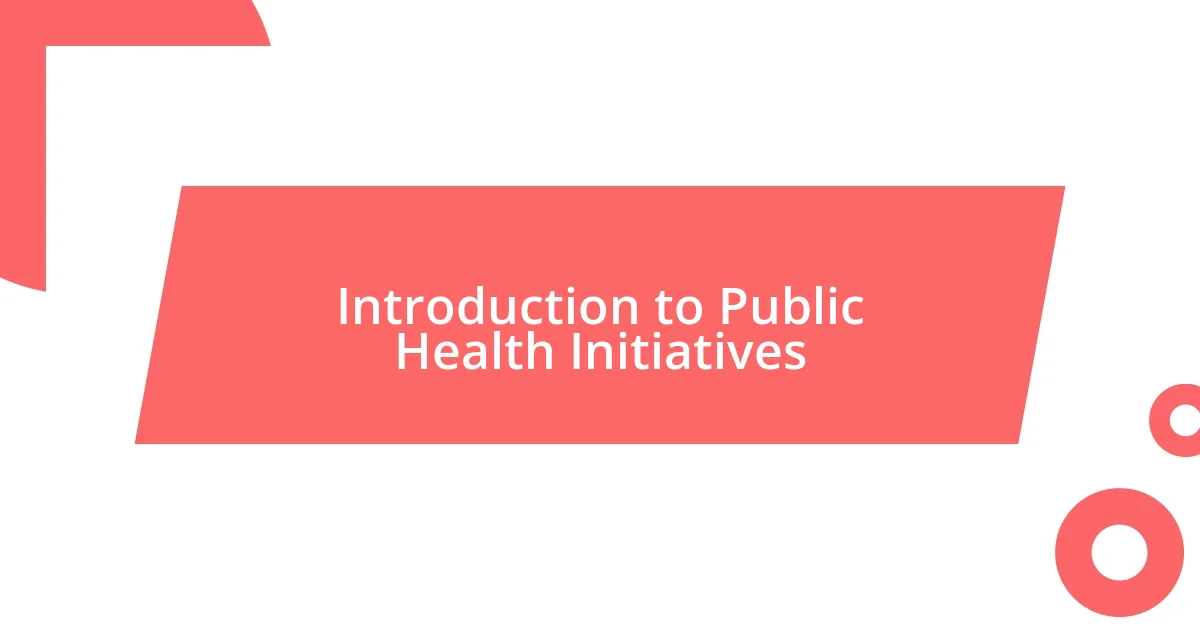
Introduction to Public Health Initiatives
Public health initiatives are structured efforts aimed at improving the health and well-being of communities. I remember my first encounter with a public health campaign aimed at promoting vaccination in a local school. The energy and enthusiasm of the volunteers made a profound impact on me; I realized then how these initiatives don’t just affect health—they can transform entire communities.
When I reflect on these initiatives, I often wonder: how many lives have been changed due to simple yet effective health campaigns? For instance, I witnessed the profound changes brought about by a smoking cessation program in my neighborhood. Several friends quit smoking and are now living healthier lives. Their stories inspired others, creating a ripple effect that showcased how public health initiatives create a supportive environment for change.
One of the most compelling aspects of public health initiatives is the teamwork involved. The collaboration between healthcare professionals, community leaders, and even the residents themselves can be magical. I witnessed this firsthand during a nutrition education program where we all learned from each other. It emphasized that these initiatives are not just about delivering information; they are about building relationships and empowering individuals to take control of their health.
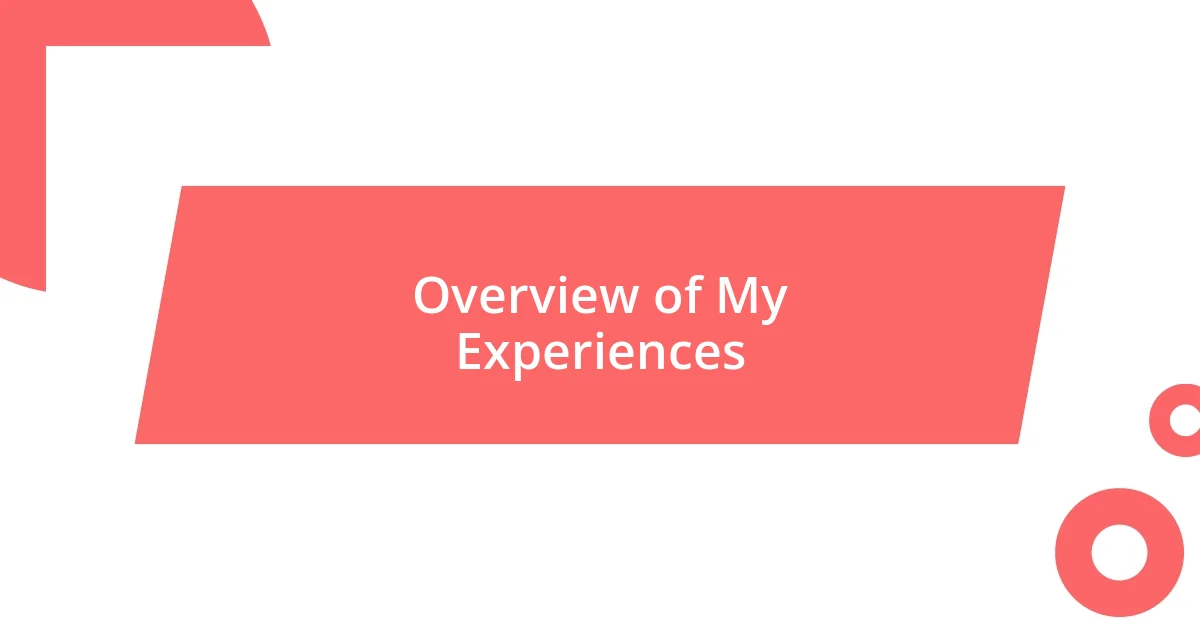
Overview of My Experiences
My experiences with public health initiatives have been both eye-opening and inspiring. I remember participating in a local health fair where various organizations came together to offer free screenings and resources. The faces of those who received unexpected news from their tests were a mix of worry and hope. It struck me how a single day of outreach could encourage individuals to seek follow-ups and prioritize their health.
- I joined a team of volunteers for a mental health awareness campaign, where we shared personal stories that resonated with many participants.
- In another initiative, I learned about the importance of environmental health while helping organize a community cleanup. Witnessing residents bond over a shared goal was heartwarming.
- Attending workshops led by public health experts opened my eyes to the statistics behind health disparities, fueling my passion for advocacy.
Overall, these experiences have shaped my understanding of the direct impact public health initiatives have on individuals and communities alike.
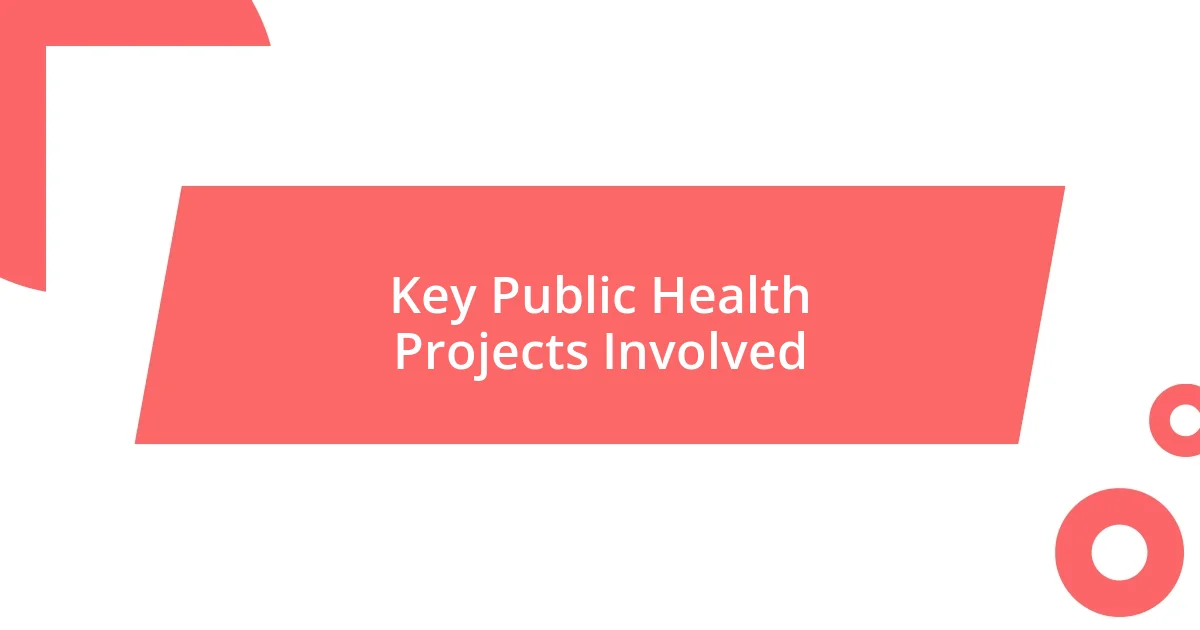
Key Public Health Projects Involved
The public health initiatives I’ve been involved with highlight the diverse approaches that can profoundly affect our communities. For instance, during a maternal health program, I engaged directly with expectant mothers, discussing prenatal care and nutrition. The gratitude I felt when mothers shared their success stories after following the advice I provided made every effort worthwhile.
I’ve also played a role in a chronic disease prevention initiative focused on diabetes management. We organized cooking classes aimed at educating participants on healthier meal options. It was moving to see attendees experiment with new recipes and witness transformations in their eating habits. Those small changes brought them hope, demonstrating the power of education within public health.
Lastly, my involvement in a youth leadership project focused on substance abuse prevention was particularly impactful. Working alongside teenagers inspired me to understand their unique challenges and needs. As we brainstormed creative outreach strategies, their passion and ideas reminded me of the potential energy that young voices can contribute to public health efforts.
| Project | Description |
|---|---|
| Maternal Health Program | Engaged with expectant mothers on prenatal care and nutrition. |
| Chronic Disease Prevention Initiative | Organized cooking classes for healthier meal options. |
| Youth Leadership Project | Collaborated with teenagers on substance abuse prevention strategies. |
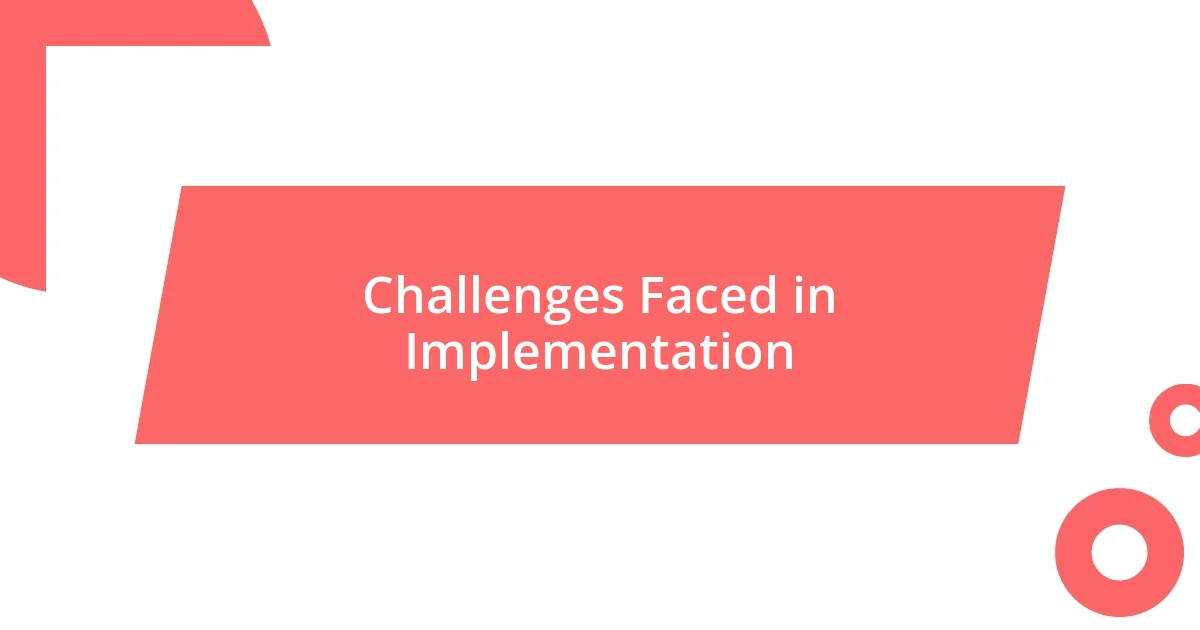
Challenges Faced in Implementation
Implementing public health initiatives often reveals a complex web of challenges. For instance, I distinctly remember a moment during a vaccination drive when we faced unexpected opposition from a small group of community members who were skeptical about vaccines. Their concerns, although founded on misinformation, highlighted the importance of effective communication and relationship-building. How do we ensure accurate information reaches those who need it most?
Another hurdle I encountered was securing consistent funding for ongoing projects. During my time with a health education initiative, we secured funding for the first year but struggled to maintain support beyond that. I learned firsthand how vital it is to create sustainable partnerships with local organizations and stakeholders. Without financial stability, even the most promising initiatives risk failure.
Lastly, I noticed that a lack of cultural competency can significantly hamper program effectiveness. I recall attending an event where materials were provided only in English, alienating many non-English speaking residents. This experience emphasized how crucial it is to tailor public health messaging to the audience’s needs and backgrounds. Have we considered how inclusivity can enhance the impact of our initiatives?
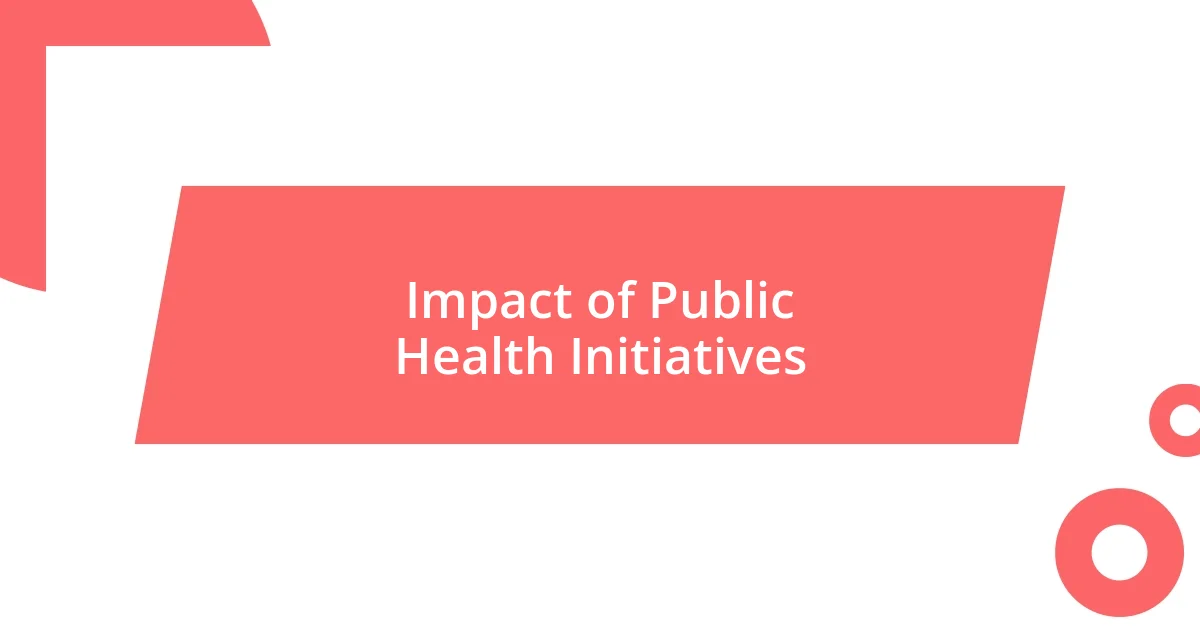
Impact of Public Health Initiatives
The impact of public health initiatives can be truly transformative. I remember working on a campaign to promote vaccinations in an underserved neighborhood. The change in attitude was palpable; as we witnessed families coming together to learn about the benefits of immunization, I felt a sense of relief wash over me. It’s amazing how education can lead to community-wide shifts in health behavior.
One of the most profound impacts I’ve observed is during health screening events. I recall a day where we offered free blood pressure and glucose screenings. The genuine gratitude from individuals who learned crucial health information they’d been unaware of was overwhelming. It’s moments like these that remind me why I’m passionate about public health; it’s not just about data, but real lives being improved.
Conversely, not every initiative produces immediate visible results. In my experience with a mental health awareness program, engagement initially seemed low, and I questioned whether our efforts would truly make a difference. However, months later, I began receiving messages from participants expressing how our workshops had empowered them to seek help. Seeing the delayed but meaningful response reinforced my belief that persistence in public health work can bear fruit, often in unexpected ways. Isn’t it exciting to think about the lasting influence we can have, even when we can’t see it right away?
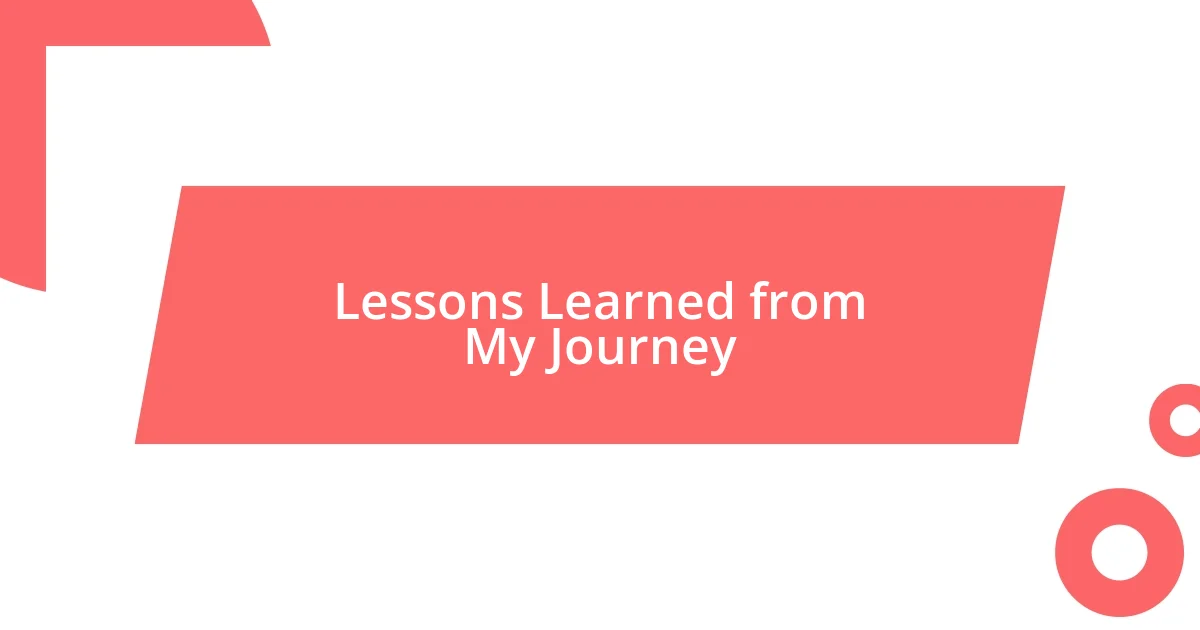
Lessons Learned from My Journey
Reflecting on my journey, one significant lesson I’ve learned is the power of patience in public health initiatives. Early on, during a nutrition education program, I rushed to implement changes, eager to see immediate results. However, I soon realized that building trust within the community takes time. The more I listened to their concerns and adapted our approach, the more successful we became. Have you ever experienced that a slower pace yielded brighter outcomes?
Another impactful lesson emerged from a project focused on mental health awareness in schools. Initially, I believed that presenting facts and statistics would be enough to engage students. Yet, I quickly grasped that sharing real stories—personal accounts of struggles and triumphs—resonated far deeper. This shift not only humanized the conversation but also fostered connection and understanding. It led me to ask: how often do we underestimate the power of storytelling in making our efforts relatable?
Moreover, I learned the importance of resilience in the face of setbacks. During a campaign around preventive health measures, we faced a significant setback when unfavorable media coverage surfaced. Rather than succumbing to discouragement, I pivoted our strategy to emphasize transparency and engage with the community directly. This taught me that facing challenges head-on can transform obstacles into opportunities for growth. Have you considered how resilience can shape our public health narratives?
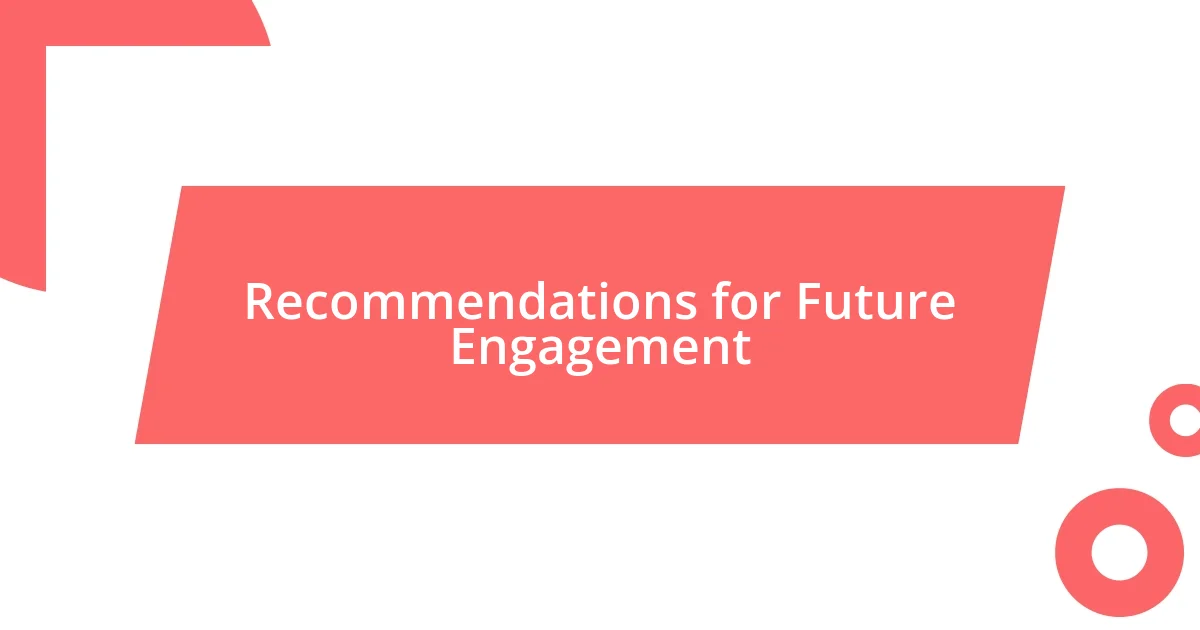
Recommendations for Future Engagement
When thinking about the future of public health engagement, I can’t help but suggest a stronger incorporation of community feedback loops. During a nutrition project, I realized that inviting participants to share their thoughts throughout the program not only strengthened relationships but also made our approach more tailored and relevant. Have you noticed how feedback often leads to unexpected insights that can reshape strategies?
I also believe in the power of utilizing technology to reach broader audiences. I once started a social media campaign to promote mental health resources, and it was eye-opening to see how many conversations began online. Social media broke down barriers, allowing individuals to express their stories and connect with others they might never meet otherwise. Isn’t it interesting how digital platforms can enhance visibility and accessibility for vital health information?
Lastly, fostering collaborations is essential for maximizing impact. I remember teaming up with local businesses to host health fairs, which attracted a diverse group of attendees. This collaborative approach not only spread awareness but also validated the importance of community involvement in public health. What if we all committed to creating these partnerships, recognizing that collective efforts can amplify our voices and reach?

